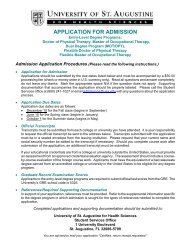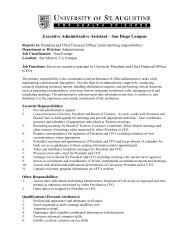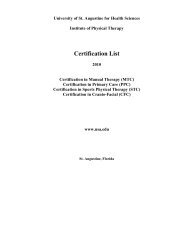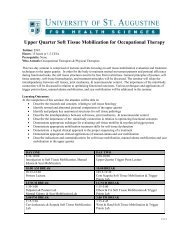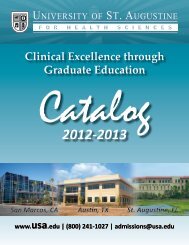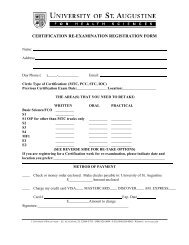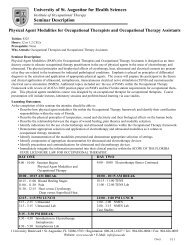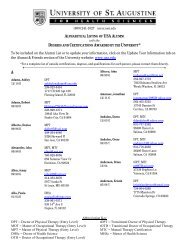HSA 6101E – <strong>Health</strong> Services Administration Hours: 3This course examines the functions <strong>of</strong> a rehabilitation manager. Content includes ethical-legalconsiderations, applicable state and federal statues, marketing, fiscal resource management, and staffproductivity. Emphasis is placed on decision making, change implementation, and quality controlprocesses in health care organizations. <strong>St</strong>udents have the opportunity to analyze problems and developstrategies <strong>for</strong> change in a variety <strong>of</strong> hypothetical settings.HSA 6101 - <strong>Health</strong> Services Administration Hours: 3This online course examines the functions <strong>of</strong> a rehabilitation manager. Content includes staff resourcemanagement, strategic planning, marketing, and fiscal resources management. Emphasis is placed ondecision-making, change implementation, and quality control processes in health care organizations.<strong>St</strong>udents have the opportunity to analyze problems and develop strategies <strong>for</strong> change in a variety <strong>of</strong>hypothetical rehabilitation settings.HSA 6201 – Organizational Leadership and Policy in <strong>Health</strong> Care Hours: 3Effective leadership in healthcare is critical <strong>for</strong> developing, implementing, sustaining, and modifyingappropriate policies to address major health concerns including controlling costs, increasing access toservices, improving the quality <strong>of</strong> health services, and enhancing the effectiveness <strong>of</strong> program outcomes.A skilled work<strong>for</strong>ce, ethical and trained leaders, and effective policies are integral to the implementation<strong>of</strong> programs and services that successfully promote the public’s health. The goal <strong>of</strong> this course is toexamine the conceptual, methodological, and ethical foundations <strong>of</strong> healthcare leadership andadministration leading to the development and analysis <strong>of</strong> health related policy at all levels. The coursewill focus on analyzing the process <strong>of</strong> policymaking in the <strong>for</strong>mulation, implementation, adoption, andmodification phases <strong>of</strong> current health policy through effective leadership and administration.HSC 5001 – Research I: Scientific Inquiry/Critical Thinking Hours: 2Although there are many ways <strong>of</strong> knowing, it is only when we critically evaluate our thoughts,assumptions and beliefs that can we be confident in the quality <strong>of</strong> the conclusions that we make about theworld and ourselves. This course is divided into two parts. Part One (Scientific Inquiry) is anintroduction to research methods, psychometric properties <strong>of</strong> tests and measures as used in the clinicalsituation <strong>for</strong> diagnosis, prognosis, and outcome assessment, sampling, experimental design, and statistics.Part Two (Critical Thinking) introduces clinical critical thinking through the principles <strong>of</strong> activereasoning, active teaching and learning, active questioning and self-assessment. The areas <strong>of</strong> logic,problem solving, hypothesis generation, domains <strong>of</strong> learning, and pr<strong>of</strong>essional abilities are highlighted.Socratic questioning is the chief method <strong>of</strong> student dialogue.The Scientific Inquiry segment enhances inquiry skills from both multicultural and multi-pr<strong>of</strong>essionalviewpoints. The main emphasis <strong>of</strong> the scientific inquiry portion is to allow the students to become criticalconsumers <strong>of</strong> the scientific literature needed to guide evidence-based clinical practice and perhaps setsome on the way to producing such scientific literature <strong>for</strong> themselves. The Critical Thinking segmentcombines instruction in clinical critical thinking through the principles <strong>of</strong> active reasoning, activeteaching-learning, active questioning and self assessment. The areas <strong>of</strong> logic, problem solving,hypothesis generation, domains <strong>of</strong> learning, pr<strong>of</strong>essional abilities are highlighted. Socratic questioning isthe chief method <strong>of</strong> student dialogue. The purpose <strong>of</strong> this section <strong>of</strong> this course is to enhance criticalthinking skills from both multicultural and multi pr<strong>of</strong>essional viewpoints.HSC 5100C - Applied Human Anatomy Hours: 4Applied Human Anatomy consists <strong>of</strong> three (3) one-hour lectures and three (3) hours <strong>of</strong> lab per week.Laboratory sessions primarily involve the study <strong>of</strong> bones and models. Lectures are designed toconcentrate on the neuromuscular, musculoskeletal and cardiovascular systems, integrating functional92
and clinical correlations. In addition, pertinent in<strong>for</strong>mation on microscopic and developmental anatomywill be presented. <strong>St</strong>udents will work in assigned lab groups to improve interpersonal, oral and nonverbalskills.HSC 5122C - Biomechanics Hours: 4Biomechanics consists <strong>of</strong> three (3) one-hour lectures and two (2) two-hour labs per week. The course issubdivided into three topic areas. The first area is general biomechanics during which students willreceive basic in<strong>for</strong>mation on <strong>for</strong>ce, loading, stress, strain, energy, work, elasticity, and basic mechanicsas it applies to biological systems. The second area deals with joint mechanics <strong>of</strong> the upper extremity,lower extremity and vertebral column and gait. The third topic area concentrates on tissue mechanics.In this section, students receive in<strong>for</strong>mation on the mechanics <strong>of</strong> bone, cartilage, tendons/ligaments,nerves and muscle and how these tissues respond to loading and aging. The lab consists <strong>of</strong> cadaverdissection <strong>of</strong> the extremity, back, thorax, abdomen, pelvis, head and neck as well as the viewing <strong>of</strong>radiographs and MRIs.HSC 5142 – Child Development Hours: 3The course will include the following: normal development across domains, developmental theories,reflexes and the role <strong>of</strong> reflexes in movement development, an overview <strong>of</strong> abnormal development and itsclinical outcomes, and public laws that affect pediatric practice (schools and early intervention).Assessment and intervention strategies <strong>for</strong> pediatrics are introduced. The course will cover medicalconditions specific to the pediatric population and therapy intervention.HSC 5151C - Clinical Neuroscience Hours: 5Clinical neuroscience is a five-credit lecture and lab course in which students receive theneuroanatomical and neurophysiological foundations <strong>for</strong> understanding normal function, dysfunction andclinical interventions. There is an emphasis on the neuroscience related to posture, movement, cognitionand sensory functions. Cadavers and models are used to enhance the students’ three dimensionalunderstanding <strong>of</strong> the material. The neuropathology component <strong>of</strong> the course uses a case study <strong>for</strong>mat tostrengthen the students’ knowledge <strong>of</strong> the etiology and clinical features <strong>of</strong> the neurological conditionsthat they are most likely to treat in clinical practice.HSC 5213C – Skills and Procedures Hours: 4This course will introduce the student to basic clinic skills and problem-solving abilities to be built uponin future course work. It is an introductory course in basic assessment techniques and general patientcare skills such as: principles <strong>of</strong> body mechanics, infection control methods, bed mobility, positioning,draping, transfer training, gait training, wheelchair use, posture assessment, joint range <strong>of</strong> motion, andgoniometric measurements. <strong>St</strong>udents will also develop pr<strong>of</strong>essional behaviors and communication skills<strong>for</strong> use with patients, families and other healthcare pr<strong>of</strong>essionals.HSC 5351 - Pharmacology Hours: 2This course provides Occupational and Physical Therapy students with the general concepts <strong>of</strong>pharmacology as applicable to clinical practice. It describes classes <strong>of</strong> drugs commonly used by patientstreated by therapists. These descriptions include: a) clinical uses, b) therapeutics effects and mechanisms,c) side effects, and contraindications. The effects <strong>of</strong> exercise, aging and other factors onpharmacodynamics are also included when relevant to clinical practice.HSC 5416 - General Pathology Hours: 3This course is designed to provide the student with basic understanding <strong>of</strong> the cause <strong>of</strong> failure <strong>of</strong> normalphysiological process in the body – the disease process. Emphasis will be on morphologic changes incells and tissues that may have resulted in specific diseases identify causes <strong>of</strong> such changes (etiology),the mechanism <strong>of</strong> development <strong>of</strong> such changes (pathogenesis) and the clinical manifestation <strong>of</strong> diseases.93
- Page 4 and 5:
San Diego sunsetSt. Augustine and o
- Page 6 and 7:
STUDENT SERVICES ..................
- Page 8 and 9:
DOCTOR OF EDUCATION (EdD) .........
- Page 10 and 11:
San Marcos, California CampusSt. Au
- Page 12 and 13:
certification. A felony conviction
- Page 14 and 15:
In 1996, the Institute of Occupatio
- Page 16 and 17:
Learning Resource CenterThe Univers
- Page 18 and 19:
ENTRY-LEVEL PHYSICAL THERAPY, OCCUP
- Page 20 and 21:
SUMMER 2012 TRIMESTERApril 30Intern
- Page 22 and 23:
TRANSITONAL DOCTOR OF PHYSICAL THER
- Page 24 and 25:
BOARD OF TRUSTEESMr. Joseph Taylor,
- Page 26 and 27:
• Graduate Record Examination sco
- Page 28 and 29:
• The right to inspect and review
- Page 30 and 31:
San Marcos Campus: The full-time DP
- Page 32 and 33:
Transitional Doctor of Physical The
- Page 34 and 35:
Scholarships are awarded to the ent
- Page 36 and 37:
San Marcos Campus - The entry-level
- Page 38 and 39:
Director, will determine if the sub
- Page 40 and 41:
The student obtains and submits the
- Page 42 and 43:
Good Academic Standing StatusPrior
- Page 44 and 45:
Appeal letters should address:• T
- Page 46 and 47:
TUITION AND FEESThe University of S
- Page 48 and 49:
Currently enrolled students who are
- Page 50 and 51:
TRIMESTER IITrimester HoursHSC 5122
- Page 52 and 53: TRIMESTER IITrimester HoursHSC 5122
- Page 54 and 55: Dual Degree Option (MOT and DPT)The
- Page 56 and 57: TRIMESTER IXTrimester HoursPHT 5824
- Page 58 and 59: Mission StatementThe mission of the
- Page 60 and 61: TRIMESTER XTrimester HoursPHT 5140C
- Page 62 and 63: TRIMESTER IITrimester HoursHSC 5122
- Page 64 and 65: TRANSITIONAL DOCTOR OF OCCUPATIONAL
- Page 66 and 67: Delivery of transitional OTD Course
- Page 68 and 69: BSC 6101 Application of Motor Contr
- Page 70 and 71: TRANSITIONAL DOCTOR OF OCCUPATIONAL
- Page 72 and 73: Delivery of OTD CourseworkCourses i
- Page 74 and 75: Advanced Practice CoursesBSC 6001 F
- Page 76 and 77: TRANSITIONAL DOCTOR OF PHYSICAL THE
- Page 78 and 79: • For the speciality clinical tra
- Page 80 and 81: Craniofacial TrackCourse # Course T
- Page 82 and 83: TRANSITIONAL DOCTOR OF PHYSICAL THE
- Page 84 and 85: • If a Clinical Residency is chos
- Page 86 and 87: Craniofacial TrackCourse # Course T
- Page 88 and 89: DIVISION OF POST-PROFESSIONAL STUDI
- Page 90 and 91: Complete a minimum of one (1) cours
- Page 92 and 93: TUITION AND FEES - Doctor of Health
- Page 94 and 95: A credentialing evaluation from an
- Page 96 and 97: COURSE DESCRIPTIONSPrefix key:BSC -
- Page 98 and 99: scientific literature needed to gui
- Page 100 and 101: EDF 7125 - Organizational Leadershi
- Page 104 and 105: In addition, the course will addres
- Page 106 and 107: individual reasoning and acquired k
- Page 108 and 109: HSC 7300 - Imaging for Physical and
- Page 110 and 111: OCT 5005 - Clinical Reasoning Hour:
- Page 112 and 113: OCT 5802 - Fieldwork IA Hour: 1This
- Page 114 and 115: OCT 6497 - Capstone Project 2 Hours
- Page 116 and 117: Assignments and course work will em
- Page 118 and 119: elective area of orthopaedic examin
- Page 120 and 121: learning, and skill acquisition. Ne
- Page 122 and 123: PHT 5805 - Practicum II Hours: 2Thi
- Page 124 and 125: anatomical principles for the enhan
- Page 126 and 127: sixth day. Prerequisites are BSC 60
- Page 128 and 129: practice where they will have the o
- Page 130 and 131: DIVISION OF PROFESSIONAL EDUCATIONC
- Page 132 and 133: Sports Physical Therapy Certificati
- Page 134 and 135: Advance Payment ProgramThe Advance
- Page 136 and 137: CLINICAL ORTHOPAEDIC RESIDENCYThe u
- Page 138 and 139: ORTHOPAEDIC MANUAL PHYSICAL THERAPY
- Page 140 and 141: FACULTY FOR CONTINUING PROFESSIONAL
- Page 142 and 143: Robert Stanborough, PT, Assistant P
- Page 144 and 145: Matthew Daugherty, PT, OTR/L, Instr
- Page 146 and 147: Marcia Kessack, RN, Adjunct Faculty
- Page 148 and 149: Marilyn Miller, PT, Associate Profe
- Page 150 and 151: Robert Stanborough, PT, Assistant P
- Page 152:
Clinical ExcellenceThrough Graduate



